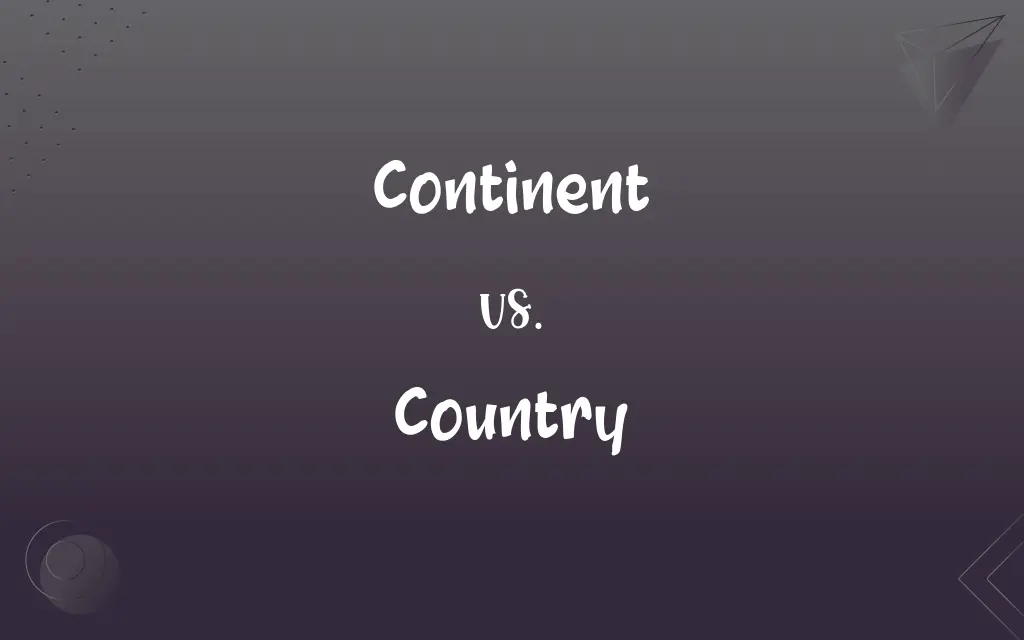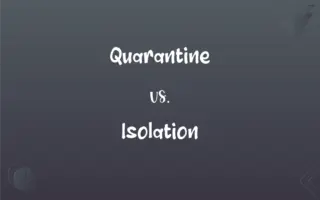Continent vs. Country: What's the Difference?
Edited by Janet White || By Harlon Moss || Updated on October 18, 2023
A continent is a vast landmass; a country is a political or territorial division within it.

Key Differences
A continent is one of several large landmasses on Earth, distinguished by its expansive geographical size. A country, on the other hand, is a defined territory governed by its own political and administrative machinery. While the Earth comprises seven continents, there are nearly 200 countries.
The concept of a continent stems from geographical and physical features, such as distinct tectonic plate boundaries. In contrast, a country is often a result of historical, cultural, and political factors, with boundaries that can change over time due to various reasons.
Furthermore, a continent can be home to multiple cultures, languages, and ecosystems, while a country might have its own unified identity, culture, and governance. For example, Africa is a continent with 54 countries, each having its unique history, culture, and governance.
While both continents and countries are fundamental in the study of geography, continents provide a macro perspective of the Earth's land distribution, whereas countries offer a more specific and detailed view of individual regions within those landmasses.
Comparison Chart
Basic Definition
A large continuous area of land on Earth.
A distinct territorial body or political entity.
ADVERTISEMENT
Origin of Concept
Geographical and physical features.
Historical, cultural, and political factors.
Number Globally
Seven (Asia, Africa, North America, etc.)
Nearly 200.
Subdivisions
Contains countries, regions, or territories.
Divided into states, provinces, or regions.
Example
Asia is a continent.
Japan is a country on the Asian continent.
Continent and Country Definitions
Continent
A continent is one of the primary divisions of the world's land.
Africa is a continent rich in biodiversity.
ADVERTISEMENT
Country
Countries have their own legal systems and administrations.
In the country of India, Hindi and English are the official languages.
Continent
A continent generally comprises multiple countries.
South America is a continent with many countries, including Brazil and Argentina.
Country
Countries can be found within continents.
Nigeria is a country located within the African continent.
Continent
A continent is a large, continuous landmass on Earth.
Asia is the largest continent by both area and population.
Country
A country is a political entity with its own governance.
Canada is a country known for its friendly people and scenic landscapes.
Continent
Continents are geologically distinct from islands.
Australia, the smallest continent, is often mistakenly referred to as an island.
Country
A country has defined territorial boundaries.
France is a country famous for its wine and art.
Continent
Continents have diverse ecosystems, cultures, and languages.
The European continent encompasses a wide range of languages and cultures.
Country
A country often has its own distinct culture and history.
Japan, as a country, has a deep-rooted history in samurai and shogunate culture.
Continent
One of the principal land masses of the earth, usually regarded as including Africa, Antarctica, Asia, Australia, Europe, North America, and South America.
Country
A nation or state.
Continent
Continent The mainland of Europe. Used with the.
Country
The territory of a nation or state; land.
FAQs
What is the difference between a country's capital and a continent's capital?
A country has a capital city, while a continent doesn't have a designated capital.
Is Russia a country or a continent?
Russia is a country; it spans both the Asian and European continents.
How many continents are there?
There are seven continents.
Can a continent have only one country?
Yes, for instance, Australia is both a continent and a country.
Which country is the largest by area?
Russia is the largest country by land area.
What defines a country?
A country is a distinct territorial body or political entity that is recognized as an independent nation.
How are the boundaries of continents decided?
Continents are typically defined by geological and geographical features.
Can a country be in two continents?
Yes, for instance, Turkey spans both Europe and Asia.
Is Antarctica a country?
No, Antarctica is a continent without any country. It's governed by the Antarctic Treaty System.
Are continents and countries static?
While continents remain relatively static, country borders can change due to political reasons.
Are there countries not recognized by other countries?
Yes, there are de facto countries with limited international recognition.
Is every country on a continent?
Primarily yes, but there are island nations that are considered part of continental regions, like Japan being part of Asia.
Can countries exist on multiple continents?
Yes, for example, Russia and Turkey are in both Asia and Europe.
Why do some countries have "Democratic" or "Republic" in their names?
Those terms refer to the form of governance or historical events in that country.
Are all landmasses either countries or continents?
No, there are territories, regions, and islands that might not be recognized as countries or part of main continents.
Which continent has the most countries?
Africa, with 54 recognized countries.
What's the difference between a country and a kingdom?
A kingdom is a type of country that is ruled by a monarch, like the United Kingdom.
Which continent is the smallest?
Australia, when considered as a continent separate from Oceania, is the smallest.
Can a city be bigger than a country?
Yes, in terms of population. For example, the city of Tokyo has a larger population than some countries.
Which continent has the smallest population?
Antarctica, as it doesn't have a native population and only hosts researchers.
About Author
Written by
Harlon MossHarlon is a seasoned quality moderator and accomplished content writer for Difference Wiki. An alumnus of the prestigious University of California, he earned his degree in Computer Science. Leveraging his academic background, Harlon brings a meticulous and informed perspective to his work, ensuring content accuracy and excellence.
Edited by
Janet WhiteJanet White has been an esteemed writer and blogger for Difference Wiki. Holding a Master's degree in Science and Medical Journalism from the prestigious Boston University, she has consistently demonstrated her expertise and passion for her field. When she's not immersed in her work, Janet relishes her time exercising, delving into a good book, and cherishing moments with friends and family.
































































